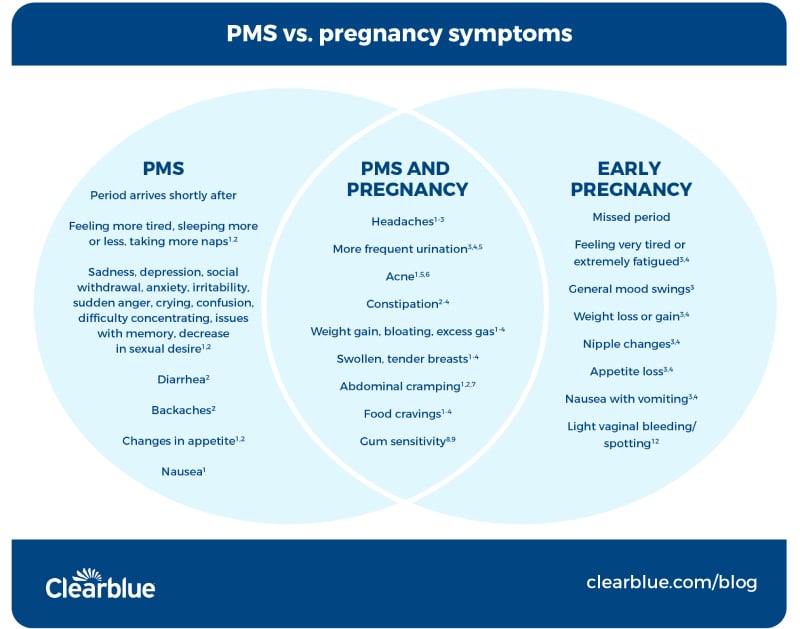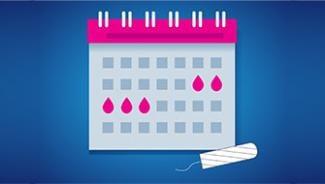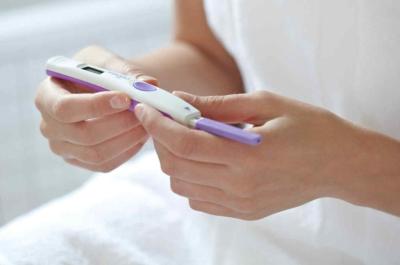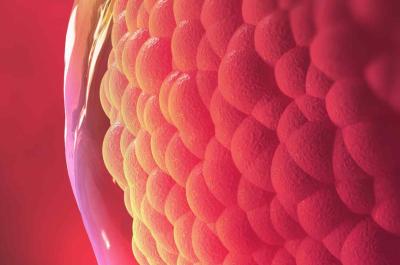PMS vs. pregnancy symptoms

If you’re feeling a bit crampy and tired, and your period is almost due, you may wonder if the symptoms you’re feeling mean that your period is coming or you’re pregnant.
The only way to know if it’s PMS is if your period arrives shortly after. And the only way to know if you’re pregnant is if you confirm your pregnancy with a positive pregnancy test. But there are some nuances to early pregnancy and PMS symptoms that can offer additional clues.

Looking for insights on your health journey? Clearblue® sends you curated, science-backed articles right to your inbox.
What is PMS?
According to The American College of Obstetricians and Gynecologists (ACOG), the “PM,” or “premenstrual,” in “PMS” refers to the physical or mood changes women experience in the days before their period starts. The “S,” or “syndrome,” in “PMS” refers to instances in which these symptoms occur every month, affecting your daily routine and life.1
Because these symptoms can be similar to early pregnancy symptoms, women who experience PMS symptoms may wonder, “Am I about to get my period" or am I pregnant?” And it’s no wonder they ask, because the differences in symptoms can be subtle.
PMS symptoms vs. pregnancy symptoms: How to tell the difference
Which PMS symptoms overlap with early pregnancy symptoms?
- Headaches1-3
- More frequent urination3,4,5
- Acne1,5,6
- Constipation2-4
- Weight gain, bloating and gas1-4
- Swollen, tender breasts1-4
- Abdominal cramping1,2,7
- Gum sensitivity8,9
What about sleep problems, mood changes or food cravings? For many symptoms, subtle differences can give you clues about what you might be experiencing.
Are fatigue/sleep problems a symptom of PMS or pregnancy?
Whereas PMS sleep issues vary and can include feeling a bit more tired, sleeping more or less than you normally do, taking more naps throughout the day and having trouble sleeping, early pregnancy fatigue is more commonly described as “extreme” or “feeling very tired.”1-4
Are mood changes a symptom of PMS or pregnancy?
While general mood swings are considered an early pregnancy symptom, specific mood changes commonly known to occur with PMS include feelings of sadness, depression, not wanting to be around other people, anxiety, irritability, sudden bouts of anger, crying more than usual, feelings of confusion, difficulty concentrating, issues with memory, clumsiness and a decrease in sexual desire.1-3
Is diarrhea a PMS symptom or pregnancy symptom?
Diarrhea is a common symptom of PMS, but not of pregnancy.2
Are bloating and weight changes symptoms of PMS or pregnancy?
It’s possible to experience weight gain, bloating and excess gas with both early pregnancy and PMS. Some women experience weight loss early in their pregnancy, especially those who have more severe nausea with vomiting.1-4
Are sore breasts a symptom of pregnancy or PMS?
With both early pregnancy and PMS, your breasts may be swollen, more sensitive and more tender. When pregnant, you may see more nipple changes, including nipples that stick out more and darkened areolas.1-4
Are cramps and aching symptoms of PMS or pregnancy?
Abdominal cramping and backaches are common PMS symptoms.1,2 While abdominal pain is also common in early pregnancy, if, after a confirmed pregnancy test, your abdominal pain accompanies other symptoms (such as bleeding, lower back pain, unusual vaginal discharge or severe pain), be sure to contact your healthcare provider.7
Is nausea a symptom of PMS or pregnancy?
While nausea is a common symptom with both early pregnancy and PMS, nausea with vomiting tends to be more common with early pregnancy.1,3,4
Are appetite changes a symptom of PMS or pregnancy?
When pregnant, you may find yourself craving certain foods while avoiding others, and you may even lose your appetite altogether during the early stages. PMS typically comes with food cravings and changes in your appetite.1-4
Are sensitive teeth a PMS or pregnancy symptom?
Gum sensitivity, which can lead to the sensation of having sensitive teeth, can be a symptom of PMS and pregnancy.8,9 In both cases, hormones are to blame.9
Gum and tooth sensitivity before your period, also called menstruation gingivitis, is caused by rising estrogen and progesterone levels.8 As these hormone levels increase, so does the blood flow to your gums. That increased blood flow can make your gums more sensitive to plaque or bacteria.8
Gum and tooth sensitivity can also be a sign of pregnancy — but typically occurs between months two and eight after conception.9 As the American Dental Association (ADA) puts it: “During pregnancy, your body is in hormonal hyper drive.” As a result, some women experience pregnancy gingivitis, which the ADA describes as “a mild form of gum disease that causes gums to be red, tender and sore.”9

Questions about PMS vs. pregnancy symptoms
If I have no PMS symptoms, does that mean I’m pregnant?
Not necessarily! The symptoms of PMS can change throughout your life,2,10 and they can’t always be predicted11 — in other words, the PMS symptoms you’ve grown to expect in your 20s might change in your 30s or 40s. Having no PMS symptoms at all doesn’t automatically mean you’re pregnant, but if it’s past the day of your expected period, the only way to know for sure is to take a pregnancy test and get a positive result.
Am I spotting from implantation bleeding, or could this be the start of my period?
If you are pregnant, you may experience implantation bleeding, which is bleeding that results from a fertilized egg implanting (hence the name) in your uterine lining.12 But how can you tell the difference between the light spotting of implantation bleeding and the start of your period? According to the website What to Expect, if you are pregnant, light bleeding could indicate an ectopic pregnancy, so it’s important to talk through your symptoms with your healthcare professional.12 What to Expect also advises to look at the timing, the color of the blood and any accompanying symptoms, which could indicate pregnancy vs. the start of your period:12
- Timing: If it’s implantation bleeding, it will “likely arrive earlier than your expected monthly menstrual period, usually about seven to 10 days after fertilization or conception.”12
- Color of blood: Some women (about one-third) report that their implantation bleeding was light bleeding or spotting that was “darker and not as red” as their normal period blood, though “for many women, the two types of bleeding aren’t different at all.”12
- Accompanying symptoms: If you’re experiencing implantation bleeding, you may have some additional symptoms, such as “mild cramping, a woozy feeling, swollen breasts [and] headache.”12
Of course, taking a pregnancy test and receiving a positive result will point you in the right direction! If that happens, reach out to your doctor as a next step.
I’m still not sure if I’m experiencing PMS or pregnancy symptoms. What should I do?
Bottom line? If you’re experiencing PMS-like symptoms and you think you could be pregnant, consider taking an early detection pregnancy test. And if there is a chance you could be pregnant and your period is late, you should definitely take a pregnancy test. Either way, it’s best to talk to your healthcare provider when symptoms persist.
Related Articles
Sources
- The American College of Obstetricians and Gynecologists. Premenstrual syndrome (PMS). Updated May 2021. Accessed September 7, 2023. https://www.acog.org/womens-health/faqs/premenstrual-syndrome
- Office on Women’s Health, U.S. Department of Health & Human Services. Premenstrual syndrome (PMS). Updated February 22, 2021. Accessed September 7, 2023. https://www.womenshealth.gov/menstrual-cycle/premenstrual-syndrome
- Office on Women’s Health, U.S. Department of Health & Human Services. Stages of pregnancy. Updated February 22, 2021. Accessed September 7, 2023. https://www.womenshealth.gov/pregnancy/youre-pregnant-now-what/stages-pregnancy
- The American College of Obstetricians and Gynecologists. Changes during pregnancy. Updated October 2020. Accessed September 7, 2023. https://www.acog.org/womens-health/infographics/changes-during-pregnancy
- Moreno MA, Zuckerman AZ, Medscape. Premenstrual syndrome clinical presentation. Updated February 19, 2021. Accessed September 7, 2023. https://emedicine.medscape.com/article/953696-clinical
- The American College of Obstetricians and Gynecologists. Skin conditions during pregnancy. Updated July 2022. Accessed September 7, 2023. https://www.acog.org/womens-health/faqs/skin-conditions-during-pregnancy
- National Health Service. Stomach pain in pregnancy. Updated June 20, 2021. Accessed September 7, 2023. https://www.nhs.uk/pregnancy/related-conditions/common-symptoms/stomach-pain/
- Bradley S, Health. Menstruation gingivitis: why your gums hurt before your period. Updated August 11, 2022. Accessed September 7, 2023. https://www.health.com/condition/pregnancy/the-weird-thing-that-can-happen-to-your-teeth-before-your-period
- MouthHealthy. Hormones and dental health: what every woman needs to know. Accessed September 7, 2023. https://www.mouthhealthy.org/all-topics-a-z/womens-hormones-and-dental-health
- Pratt E, Health. Here’s how PMS can change in your 20s, 30s, 40s. Updated January 11, 2023. Accessed September 7, 2023. https://www.health.com/condition/menstruation/pms-changes-20s-30s-40s
- Cleveland Clinic. Premenstrual syndrome. Updated October 12, 2022. Accessed September 7, 2023. https://my.clevelandclinic.org/health/diseases/24288-pms-premenstrual-syndrome
- Donaldson-Evans C, What to Expect. What is implantation bleeding and when does it occur? Updated May 23, 2023. Accessed September 7, 2023. https://www.whattoexpect.com/getting-pregnant/implantation-bleeding/

7 questions about your period you’ve never dared to ask
Chances are that you learned the basics about your period sometime ago but not what you really want to know. And what you really want to know, you may be too embarrassed to ask.
Rest assured, you’re not the only one and we've got answers to seven (perfectly normal) period-related questions.

All you need to know about your period
Even if you get your period every month, how much do you really know about periods?




